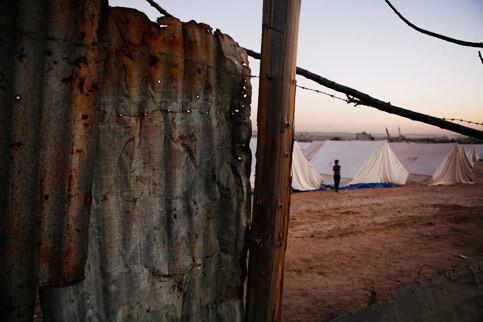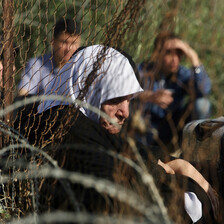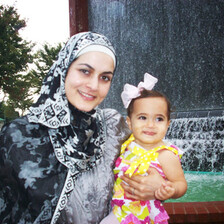The Electronic Intifada 14 July 2009

A Palestinian boy stands near tents erected for families whose homes were destroyed during the Israeli assault on Gaza last winter. (Matthew Cassel)
I will never forget the image of the elderly woman whose son was dying in a hospital in Egypt. She only wanted to be with him. Crying, her hand touching the glass window of the office of the Egyptian intelligence services, she pleaded, “Please, please. I beg you, show mercy, let me go in.” Another woman sat by the State Security office, looking up at an officer blocking her path. “You promised to let me in,” she said with her soft, tired and drained voice. “Please let me in” she repeated calmly with her tired voice, then she looked at me with wide, tearful, sad eyes.
I came to Gaza a week before Israel’s winter invasion began. After seven months, I spent two days at Rafah crossing with the Egyptian authorities refusing to allow me to return to Lebanon, despite having all the necessary coordination documents, approval and permission from the Egyptian Ministry of Foreign Affairs.
The Egyptian authorities made people wait in the arrival hall at the Rafah crossing, sitting on filthy floors where names for either the entry to Egypt or to return to Gaza were called by the voices of aggressive Egyptian police officers, or state security or intelligence personnel. After hours of waiting, two officers headed towards us: “you are being returned to Gaza.” “No!” we would reply, “We have coordination documents!” But, the officers and intelligence personnel grew angrier and threw the papers in our faces humiliatingly: “This means nothing! Move on! Hurry!”
After being asked numerous times “what were you doing in Palestine for seven months,” I answered the intelligence officer simply, “what you didn’t do.” Another officer asked, “How did you come to Gaza?” “By the boats” I replied, referring to the Free Gaza Movement ship that brought me. “So, now you know why you … can’t leave,” he answered back.
It was a simple message to the Free Gaza Movement and anyone hoping to break the siege: they and the Palestinians will be punished. Yet, it must be done, something must be said, this injustice cannot be allowed to stand in silence, whatever the price. And there is a huge price to pay — that of not being able to go back.
As I was explaining the situation to someone on the phone, a sick, elderly Palestinian man fell to the ground unconscious. I approached as a state security officer began dragging the elderly man across the floor. I was intercepted by Said, the intelligence officer, who pointed his finger at me and said in a cruel and wicked tone, “I will make sure you will never get out of here.” I countered, quoting the Palestinian poet Mahmoud Darwish, “all that you have done to our people is registered in notebooks.” He replied in a vindictive tone, “Really? Who will hold us accountable?”
I watched as my International Solidarity Movement (ISM) colleague Jenny was dragged across the floor by security officers screaming, “Get off of me! Get off of me!” I watched her disappear behind a wall as I clung to a window and the officers came for me. I looked at each of the men in the eye, knowing I had to humanize them to humanize myself. I asked them, “You have a daughter my age? I am 21.” There was no reply. I tried again, “Would you accept your daughter being treated this way? I am your daughter, and your daughter and your daughter.” I was pulled away by my wrists and dragged along the dirty floor, and the man dragging me said, “You are lucky my shoe is not in your mouth.”
At Rafah, I saw a voiceless Palestinian man in a wheelchair being pulled and shaken. I watched women begging on their knees, children and the elderly sitting on dirty floors. And all us were dragged by the Egyptian security officers and thrown out.
At Rafah I also saw laughter and love. A little girl on a bus asked her mother, “Can we gather a shekel from each to give to the Egyptians to pass through?” I watched as people shared bread and water, share laughter as well as pain and tears. Yes, we laughed. Laughter and love under the bombs, to laugh and love under racism, degradation, humiliation, by monsters clad in the uniforms of a brotherly Arab state.
Coming from Lebanon to Gaza initially seemed surreal. Larnaca, Cyprus was the checkpoint, and the sea was the road to Palestine. In the beginning, breaking the siege was all that came to mind. It was almost three years to the medieval, hermetic siege that the apartheid state of Israel had imposed on Gaza’s million and a half residents. All I thought of then was: Israel, the occupation, the monster. But, the monster, as I later became aware, was not one but many, who were all devouring the souls of Palestinians in Gaza. The official Arab regimes were sharing the crimes that Israel was committing. These regimes, especially Egypt, are not complicit — their participation is direct, clear, observable, noticeable, felt and lived directly, and therefore has transcended complicity into direct participation.
In Gaza, I have lived the “quintessential Palestinian experience.” I have lived a nakba, a man-made disaster, a disease of hatred, racism to the bone. In Gaza, I have lived under occupation, a brutal, savage blockade. The epitome of the Palestinian experience comes in what historian Rashid Khalidi says is lived “at a border, an airport, a checkpoint … at any one of those modern barriers where identities are checked and verified.” It is what the eminent Palestinian novelist Ghassan Kanafani described in Men in the Sun. It is Laila El-Haddad’s description of how she and her children lived suspended, humiliated, and stranded in a Cairo airport waiting and wanting to return home to Gaza.
It is the experience of every Palestinian. I became a Gazan — I am now a refugee, a prisoner. I am now, as El-Haddad explained, holding a passport “that allows no passage. A passport that denied me entry … to mark me, brand me, so that I am easily identified and cast aside without questions; it is convenient for those giving the orders. It is a system for the collective identification of those with no identification.”
I came to stand with the suffering, besieged Palestinians in the Gaza Strip. I came to learn from their resistance, in all its forms, and to fight hand in hand with local activists in acts of non-violent civil resistance. After all, I came from a supposed “resisting Lebanon” and therefore, resistance was no stranger to me. I came to Gaza to confront the occupation and know it through a window other than that of the biased petrol-dollar media of our times. And I did.
I learned that the Arab regimes were Israel’s best friends in the region, not out of love of the colonizer, but out of the intense hatred they hold for the Palestinians and their own people. Oh, Palestinians, you are on your own! Where has the cause of Jerusalem gone? It was certainly not in the eyes, hearts and minds of those intelligence agents and members of the security services based at the Rafah crossing, one of Gaza prison’s gates. All I could find there was hate.
The psychological and physical torture Palestinians are subjected to at the Rafah crossing is a clear message from the Egyptian authorities. It is intended to frighten and punish the Palestinian people and all those who stand in solidarity with them. The Egyptian authorities at the crossing violated our basic human rights, a daily reality for Palestinians. The degrading and the humiliating manner in which we were treated also violated our rights as women.
During my time in Gaza, as in July 2006 in Lebanon, I endured a hellish assault and massacre designed to break a people but which once again only revealed the criminality of the apartheid regime and the complicity of the international community. Gaza is our South Africa, our Guernica. The Palestinian people exceed their unworthy leadership, and if there is a victory it is that of the people who endured, who drank tea above the rubble of their destroyed homes, who still stand up high, steadfastly against their uprooted olive trees, against occupation, betrayal, complicit silence, and neglect.
Natalie Abou Shakra is an activist from Lebanon and is affiliated with the International Solidarity Movement and Free Gaza Movement. She defied Israeli orders for Lebanese citizens not to go to Gaza and was able to get in with the Free Gaza movement’s SS Dignity on the 20 December 2008.


